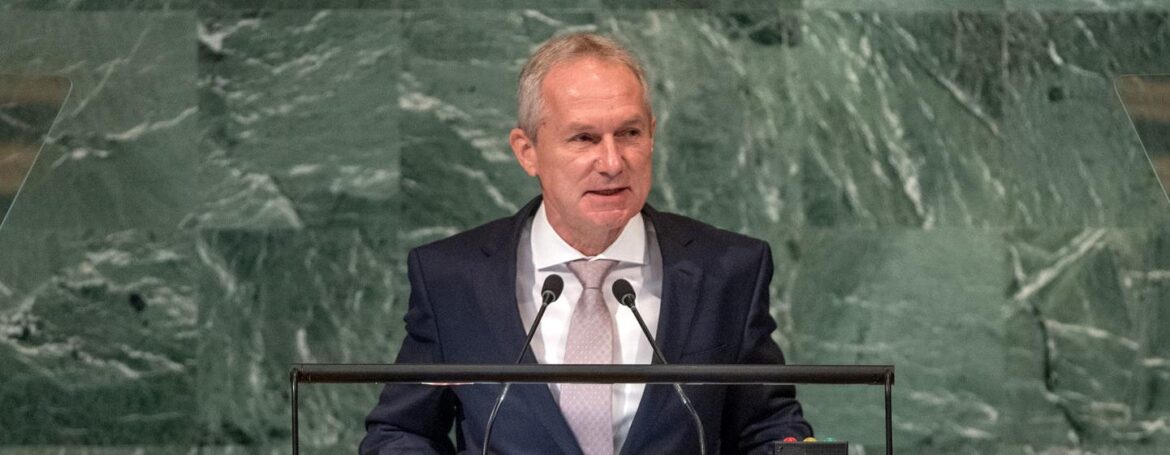By Asmau Ahmad
At what he called “the most consequential moment of the last four decades,” General Assembly President Csaba Kőrösi banged the ceremonial gavel to open the UN General Debate, calling for “solutions through solidarity, sustainability and science” – his motto for the Assembly’s 77th session.
Kőrösi made the call to world leaders gathered for the opening of the 77th Session of General Assembly’s high-level debate in New York.
“Solutions, because we have drafted many treaties, set excellent goals, yet have taken too little action,” he explained.
“We need solidarity because inequalities have reached record height, sustainability because we owe it to our children to leave behind a liveable world and science because it offers us neutral evidence for our actions.”
Kőrösi stated that climate change has triggered heatwaves, floods, and droughts while unsustainable consumption and production have left scars across our environment.
“We live, it seems, in a permanent state of humanitarian emergency,” he said, pointing out that over 300 million people are in urgent need of aid and protection – a 10 per cent rise since January – and that climate change, COVID-19 and conflict have pushed global hunger to “alarming levels.”
Meanwhile, inflation is at 40-year highs as violence has left one-quarter of humanity caught in instability.
“Who would have imagined that war would return to Europe? That the nuclear threat would be back in political discourse to settle a dispute with a neighbour?”
The Assembly President noted that 203 days after adopting a resolution condemning the military aggression against Ukraine, the bloodshed continues.
He elaborated on some positive developments, including a landmark agreement on commercial grain exports, diplomacy working to release fertilizers and UN nuclear inspectors preventing a possible catastrophe at one of Europe’s key nuclear sites.
Noting the debate’s theme, “A watershed moment: transformative solutions to interlocking challenges,” Kőrösi declared his solidarity with Pakistan, where devastating floods washed away hundreds of villages.
He described “heart-wrenching scenes of devastation,” as a possible “window into our future”.
However, advancements in science cooperation and climate diplomacy are on-hand solutions to tackle climate change, “but we have to want to put them in practice,” the senior UN official said.
Noting that the International Panel on Climate Change (IPCC) has proven invaluable in supporting political decisions to combat the climate crisis, he recommended replicating its success in the areas of water, energy, food and biodiversity as “a universally accepted, empirical starting point for action”.
“Once this high-level week is over, I plan to launch a series of consultations with the scientific community, asking them to help us bring…knowledge from microscopes to microphones,” he said.
The Assembly President said that the 77th session would be key in preparing the SDG Summit in 2023, and the Summit of the Future in 2024.
“Next year, we will assess SDG six at the UN Water Conference – the first since 1977,” he informed the world leaders, flagging that “this call could not be more urgent”.
As water is set to be the next major global driver of conflict, he outlined a threefold problem of “too much, not enough, [and] not safe”.
In addition, he underscored the importance of universal respect for the rule of law, warning that when human rights come under threat, “it is our smoke signal, our call to action”.
He described women’s rights as the “fundamental issue found to be lacking in most societies around the world”, saying that it was “simply unacceptable that every third woman experiences violence in her lifetime”
He further said that women were often excluded from decision-making and leadership.
“It is only when everyone is included, “that we will find solutions to the challenges we face,” Kőrösi said.
“Data shows that crisis response is more effective when women take the lead,” he continued, encouraging everyone to engage with equity, equality and human dignity.
The Assembly President offered his support to Member States and underscored the importance of “bringing our efforts out of this Hall and into our communities”.
To revitalise the Organization’s relevance in the eyes of the world, he announced his intention to advance negotiations for reforming the UN Security Council to more equitably represent 21st century realities.
“This is a matter of credibility for our entire Organization and our multilateral order,” he asserted. “Our opportunity is here and now. Let us act.”


